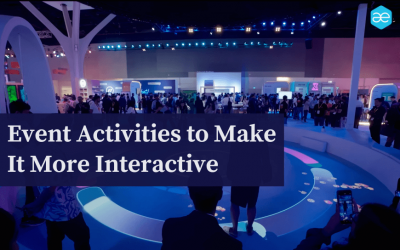Ever heard the saying that an hour of smart planning can spare you countless hours of work? Well, it’s true, especially when it comes to organizing events.
Event planning involves many tasks, and you need the right set of event management tools to execute them. And, in just 5-10 minutes of reading this blog, you will know the ultimate event management toolkit, covering every aspect from start to finish. From scheduling event planning meetings to ensuring a hassle-free check-in process for attendees, there’s a world of possibilities to make your event management journey smooth.
So, let’s discover how these tools can transform your event management process. Here is a list of event management tools that will do wonders for your upcoming event.
| Category | Tools | Description | Usecase |
|---|---|---|---|
| Event Agenda and Scheduling Tools | Calendly Notion | Tools to help plan and organize event schedules and tasks | Documenting agendas SortingPriorities Scheduling meetings |
| Social Media and Event Promotion Tools | Hootsuite Buffer Milanote | Platforms for managing event promotion on social media | Scheduling social media posts, Managing reviews and timelines |
| Email Communication Management Tools | ConvertKit Mailchimp HubSpot | Email marketing solutions for effective communication | Enhancing Communication and Outreach Audience Engagement |
| Virtual Event and Live Streaming Tools | Host Recorded Events (AllEvents) Twitch Streamyard | Tools for hosting virtual events and live streaming | Live stream your event Real-time event engagement Record and reuse your events |
| Event Check-in Tools | AllEvents Event Manager App | Mobile apps for efficient event check-in and attendee tracking | Smooth check-in process Track your attendee’s |
| Event Budgeting and Expense Tracking Tool | Airtable | Tools for budgeting and tracking event-related expenses | Track your expanse Sorting budget as per requirement |
Now, let’s dive into them in detail!
1. Event Agenda and Scheduling Tools

The first step to hosting your event is to figure out a proper event schedule – the topics, the audience, and how to get the word out.
You must use some handy event management tools to ensure your event plan runs smoothly. These event management tools will help you arrange your meetings and help you keep everything organized.
Here are two trusty ones:
Calendly
Think of Calendly as your event’s personal timekeeper. It helps you arrange the right date and time and even schedule meetings.
Notion
Notion is like your event’s notepad and checklist. It keeps track of all the things your event needs to do.
With these tools, your event planning becomes a breeze! ?️ Let these tools be your creative companions. ?
Once you’ve set up your event, the next move is to get it listed on event listing sites. And guess what? You can list your event for FREE with AllEvents!

2. Tools to Manage Social Media and Event Promotion
Once your event is planned and listed on-site, it’s time to promote it. This step is crucial. It involves various tasks like creating social media visuals like banners and posters. We have some tools for you to manage your social media event promotion:
Hootsuite
Hootsuite is a social media management platform. It allows you to schedule posts, monitor mentions, and track engagement across social networks from one dashboard. It’s a time-saver that ensures consistent posting.
Buffer
Buffer is another handy social media scheduling tool. It helps you plan your posts and provides analytics to fine-tune your social media strategy.
Milanote
Milanote is a tool to organize your projects easily. It can be useful to manage your social media content. It keeps all your important content – captions, hashtags, and event details – organized in one place for easy access.
No more searching through endless files or apps. Reviewing content is a snap, too. Collect feedback right on the boards.
With these tools, managing event promotion and social media becomes a breeze. Spend less time on the nitty-gritty and more on creating an unforgettable event.
Creating social media posts can take time, but it doesn’t have to. AllEvents makes it easy! You can create event banners, posters, social media posts, and stories in minutes. Enjoy the simplicity! ?

3. Email Communication Management Tools

Emails are powerful for event communication. It’s more than just sending messages; it’s about building connections and staying memorable.
When you have lots of contacts, managing them can be tough. And personalizing emails takes time. To simplify all this, use these tools for smoother email communication. ?✉️
ConvertKit
ConvertKit is a robust email marketing platform designed with creators and event organizers in mind. It offers customizable email templates, automation, and tagging to segment your audience effectively.
Mailchimp
Mailchimp is a well-known name in the email marketing world. It’s user-friendly and offers a range of templates, automation, and reporting features.
HubSpot
HubSpot is a comprehensive marketing automation platform that includes email marketing as one of its core features. It allows you to create personalized email campaigns, track user behavior, and nurture leads. HubSpot’s all-in-one approach helps event organizers streamline their marketing efforts and improve attendee engagement.
4. Virtual Event and Live Streaming Tools
What if you are hosting virtual events and want to record them? How will you manage this? Or maybe you just want to livestream your event to your followers or more interested people?
In today’s virtual events and live streaming world, having the right virtual event management tools is like having a trusty partner by your side!
“Host Recorded Events”~ by AllEvents
You can turn your event videos into on-demand events with the AllEvents Host Recorded Events tool. This means your audience can access them whenever they want.
You can even charge your audience to access these workshops. It’s a way to turn your recorded content into a source of income. Plus, there are no ongoing costs involved.
Twitch
Twitch is a popular platform for live-streaming content, but it has also been used for virtual events, conferences, and entertainment broadcasts. It can be a handy platform to Livestream your event to a larger audience.
Streamyard
Streamyard is a user-friendly live streaming platform that integrates with platforms like Facebook, YouTube, and LinkedIn. It’s great for broadcasting live events and interviews.
5. Event Check-in Tools

Event check-in tools make life easier for organizers and ensure attendees have a good experience from arrival. In today’s digital age, event manager applications have revolutionized handling check-ins. Technology has come a long way, from using QR codes for events to creating event badges. And having an event app on your side can make everything, including check-ins, a breeze for both you and your attendees.
AllEvents Event Manager App
The AllEvents event management app offers check-in features that allow attendees to check in using their smartphones. Event organizers can scan QR codes or barcodes displayed on attendees’ mobile devices for a contactless and hassle-free check-in experience.
7. Event Budgeting and Expense Tracking Tool
You’re in charge of planning an exciting event, but there’s a catch – you need to stay on budget. Keeping track of every expense can be daunting, but with the right tools, it becomes a breeze. Event budgeting and expense tracking tools are your trusty companions in this journey.
Airtable
Airtable is a flexible spreadsheet and database tool that can be customized for budgeting and expense tracking. Create tables to categorize expenses and track spending.
Final Words For Using the Right Event Management Tools
In the end, choosing the right event management tools is like having a superpower. They make planning easier, communication smoother, and events unforgettable.
So, pick your tools wisely, and let them be your sidekicks in creating amazing experiences.
You may like to read: Event Industry Statistics and Trends in 2024
Quick Answers
What are event management tools, and why do I need them?
Event management tools are software or platforms that help you plan, organize, and promote events efficiently. They streamline tasks, save time, and ensure your event runs smoothly.
How do event agenda and schedule tools help me plan my event?
Event agenda and scheduling tools, like Calendly and Notion, assist you in creating a structured timeline for your event. Calendly helps schedule meetings and coordinate timings, while Notion acts as a digital notepad and checklist to keep track of tasks, ensuring your event preparations stay organized.
What are email communication management tools, and why should I use them?
Email communication management tools, such as ConvertKit, Mailchimp, HubSpot, and AllEvents Email Marketing tools, make sending event-related emails more effective. They provide customizable templates, automation, and audience segmentation, allowing you to send personalized emails to your contacts. These tools help build connections and deliver value to your attendees through engaging email campaigns.
How do virtual events and live-streaming tools benefit event organizers?
Virtual event and live streaming tools offer versatile solutions, including AllEvents’ Host Recorded Events tool, Twitch, and Streamyard. With these tools, you can host recorded workshops as on-demand events, monetize your content, and reach a wider audience. Twitch and Streamyard enable live streaming of events, conferences, and entertainment broadcasts, enhancing your event’s accessibility and engagement.
What are event check-in tools, and why are they essential for events?
Event check-in tools, exemplified by the AllEvents Event Manager App, streamline attendee check-in processes. These tools utilize smartphone capabilities, allowing attendees to check in by scanning QR codes or barcodes on their devices. They enhance the efficiency of event entry and provide a seamless experience for attendees.
How can event budgeting and expense-tracking tools help in event planning?
Event budgeting and expense tracking tools, like Airtable, facilitate effective budget management. You can categorize expenses, monitor spending, and ensure your event stays within budget. These tools are essential for event organizers aiming to control costs and allocate resources efficiently.






